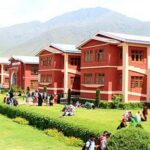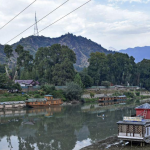Every change is inevitable when we see the transformation, hear the stories of change, and witness people on the ground engaging, improving, and participating in social, economic, and political fields. Whether through policies or awareness, change among Kashmiri women is inevitable and a reality now.
Fields like forestry, police, army, entrepreneurship, business, salons, driving, hospitality, administration, and other workplaces, where Kashmiri women were previously not interested or which were considered male-dominated—are now seeing increasing female participation. Keeping women at bay was a loss to our society, and today, our women are telling their stories themselves.
Nighat Rashid, from Baramulla, once lived in economic and social isolation. Today, she leads a tailoring cooperative employing 20 women. “I never thought anyone in power cared whether I existed. But now, we have help, guidance, and support. We are building our future on our terms.”From North Kashmir to South Kashmir, such voices echo a profound shift. The women of the Valley are no longer just passive observers of change—they are active participants and leaders.
Men and women can shape the destiny of the society together. They are the two wheels of the same carriage. As India marches towards Viksit Bharat 2047, the daughters of the Valley walk beside her—not behind. The last decade has laid the foundation, but the future lies in ensuring these changes are deep-rooted, inclusive, and irreversible. The story of Kashmiri women is no longer just about struggle—it’s about strength, vision, and leadership. No longer just survivors of history, they are now shapers of destiny.
Over the last decade, the role and position of Kashmiri women in society has undergone a visible and meaningful transformation. Once confined to traditional roles and invisible within the frameworks of economic and political development, women in the Kashmir Valley are now emerging as educated, confident, and empowered contributors to societal growth. These changes are not merely cosmetic; they are structural, policy-backed, and rooted in an era of reformation that began with the abrogation of Article 370.
No society can flourish by neglecting its women. From birth to the end of life, a woman transitions through various roles—daughter, student, worker, mother, homemaker, and leader. Her contribution is irreplaceable. Historically, Kashmiri society had its roots in inclusive traditions.
The Valley, once a beacon of spiritual and intellectual pluralism, has produced some iconic women—Kota Rani, the last Hindu queen known for her political wisdom; Habba Khatoon, whose poetic legacy still lives on; and mystic saints like Lal Ded and Rupa Bhawani, whose teachings emphasized wisdom, spirituality, and equality.
But decades of terrorism, instability, and socio-political disruptions reversed much of that progress. Women became victims of conflict, oppression, and lost opportunities. Their roles shrank within households, and their voices were often stifled. Yet, the last decade—especially after 2019—has seen a reversal of that regression. This period has marked a bold journey from marginalization to mainstreaming, from silence to leadership.
The abrogation of Article 370 in August 2019 was a watershed moment. While much of the public debate focused on political and security ramifications, for the women of Kashmir, it quietly ushered in a new age of opportunity, inclusion, and empowerment. Here’s what has changed:
Before the abrogation, laws regarding inheritance and marriage for women in Jammu and Kashmir were discriminatory. A woman who married outside the state would lose her property rights and domicile status. Post-abrogation, this discrimination has ended. Women now enjoy equal property and inheritance rights, regardless of whom they marry.
Visibly, we see the participation of Kashmiri women in significant sectors, and security and justice have improved for them. The question is; how has all this been made possible? There are always ways and thoughts to bring change not through force or pressure, but by implementing policies.
The transformation is not accidental; it has been driven by a combination of policy decisions, grassroots outreach, community involvement, and institutional support. The Central Government has established various policies in Jammu and Kashmir that are currently benefiting women not only in Kashmir but across the entire nation. These policies have enabled them to step out of the kitchen and bedrooms.
Women want empowerment, but not at the cost of male dominance or by rising above levels where women can’t be integrated equally with men. Our rightful place is where we, as women, can work more smoothly and conveniently as self-reliant members of society, living with dignity and honour.
The decade of change in Kashmiri women is worth acknowledging, but there are still many issues that need to be incorporated into the current policy under the slogan of ‘Women Empowerment.’ Considering women as equal members of our families and encouraging their independence as a step toward social upliftment is essential. Men must provide opportunities to every woman associated with them, according to her capacity and comfort.
Women also need to understand their limitations and protocols in socio-economic and moral contexts. The misconception of women as weak members of society needs to be addressed. Crises between men and women will be minimized when both understand and respect each other’s emotions and potential.
(The author writes specifically on Kashmiri women’s rights and issues. She is also pursuing PhD in Gender Studies. Feedback at: [email protected])








